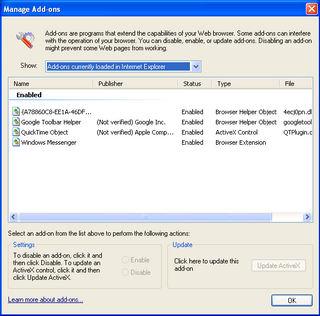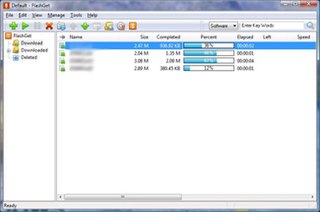
A Browser Helper Object (BHO) is a DLL module designed as a plugin for the Microsoft Internet Explorer web browser to provide added functionality. BHOs were introduced in October 1997 with the release of version 4 of Internet Explorer. Most BHOs are loaded once by each new instance of Internet Explorer. However, in the case of Windows Explorer, a new instance is launched for each window.

FlashGet was a freeware download manager for Microsoft Windows. It was originally available in either paid or ad-supported versions, the latter of which included an Internet Explorer Browser Helper Object (BHO).
FlashGot was an add-on for Firefox that allowed interoperability between the Firefox browser and external download managers. It is no longer compatible with later versions of Firefox. It is not itself a download manager but is designed to allow the Firefox interface to be extended to connect to the selected external download manager. This avoided launching the download manager as an independent application and cutting and pasting the across the links of the files that need to be downloaded. Forked browsers like Pale Moon and Waterfox are also supported.
Browser hijacking is a form of unwanted software that modifies a web browser's settings without a user's permission, to inject unwanted advertising into the user's browser. A browser hijacker may replace the existing home page, error page, or search engine with its own. These are generally used to force hits to a particular website, increasing its advertising revenue.

FrostWire is a free and open-source BitTorrent client first released in September 2004, as a fork of LimeWire. It was initially very similar to LimeWire in appearance and functionality, but over time developers added more features, including support for the BitTorrent protocol. In version 5, support for the Gnutella network was dropped entirely, and FrostWire became a BitTorrent-only client.

Zango,, formerly ePIPO, 180solutions and Hotbar, was a software company that provided users access to its partners' videos, games, tools and utilities in exchange for viewing targeted advertising placed on their computers. Zango software is listed as adware by Symantec, and is also labeled as a potentially unwanted program by McAfee. Zango was co-founded by two brothers: Keith Smith, who served as the CEO; and Ken Smith, who served as the CTO.
This comparison contains download managers, and also file sharing applications that can be used as download managers. For pure file sharing applications see the Comparison of file sharing applications.
Free Download Manager is a download manager for Windows, macOS, Linux and Android.
Christopher Boyd, also known by his online pseudonym Paperghost, is a computer security researcher.

This article details features of the Opera web browser.
The following is a general comparison of BitTorrent clients, which are computer programs designed for peer-to-peer file sharing using the BitTorrent protocol.

Orbit Downloader is a discontinued download manager for Microsoft Windows. Launched in 2006, its developers abandoned it in 2009. In 2013, Orbit Downloader was classified as malware by antivirus software after ESET discovered a botnet in the application.

JDownloader is a download manager, written in Java, which allows automatic download of groups of files from one-click hosting sites. JDownloader supports the use of premium accounts. Some parts of the code are open-source. As a popular software tool used in Europe, in December 2009 the program's website was in the top 1000 visited websites of Spain. German online magazine Chip.de designated it "newcomer of the year" in 2009, after it ranked among the top 50 most downloaded applications, with over half a million downloads in a year.
OpenCandy was an adware module and a potentially unwanted program classified as malware by many anti-virus vendors. They flagged OpenCandy due to its undesirable side-effects. It was designed to run during installation of other desired software. Produced by SweetLabs, it consisted of a Microsoft Windows library incorporated in a Windows Installer. When a user installed an application that had bundled the OpenCandy library, an option appeared to install software it recommended based on a scan of the user's system and geolocation. Both the option and offers it generated were selected by default and would be installed unless the user unchecked them before continuing with the installation.

Genieo Innovation is an Israeli company, specializing in unwanted software which includes advertising and user tracking software, commonly referred to as a potentially unwanted program, adware, privacy-invasive software, grayware, or malware. They are best known for Genieo, an application of this type. They also own and operate InstallMac which distributes additional 'optional' search modifying software with other applications. In 2014, Genieo Innovation was acquired for $34 million by Somoto, another company which "bundles legitimate applications with offers for additional third party applications that may be unwanted by the user". This sector of the Israeli software industry is frequently referred to as Download Valley.
Freemake Video Downloader is a crippleware download manager for Microsoft Windows, developed by Ellora Assets Corporation. It is proprietary software that can download online video and audio. Both HTTP and HTTPS protocols are supported. Users must purchase a premium upgrade to remove Freemake branding on videos and unlock the ability to download media longer than 3 minutes in length.

Torch was a Chromium-based web browser and Internet suite developed by the North Carolina–based Torch Media. As of November 2022, downloads for Torch are no longer available, and upon clicking the download button, users are redirected to the Torch Search extension on the Chrome Web Store.

μTorrent, or uTorrent, is a proprietary adware BitTorrent client owned and developed by Rainberry, Inc. The "μ" in its name comes from the SI prefix "micro-", referring to the program's small memory footprint: the program was designed to use minimal computer resources while offering functionality comparable to larger BitTorrent clients such as Vuze or BitComet. μTorrent became controversial in 2015 when many users unknowingly accepted a default option during installation which also installed a cryptocurrency miner.
Download Valley is a cluster of software companies in Israel, producing and delivering adware to be installed alongside downloads of other software. The primary purpose is to monetize shareware and downloads. These software items are commonly browser toolbars, adware, browser hijackers, spyware, and malware. Another group of products are download managers, possibly designed to induce or trick the user to install adware, when downloading a piece of desired software or mobile app from a certain source.
A potentially unwanted program (PUP) or potentially unwanted application (PUA) is software that a user may perceive as unwanted or unnecessary. It is used as a subjective tagging criterion by security and parental control products. Such software may use an implementation that can compromise privacy or weaken the computer's security. Companies often bundle a wanted program download with a wrapper application and may offer to install an unwanted application, and in some cases without providing a clear opt-out method. Antivirus companies define the software bundled as potentially unwanted programs which can include software that displays intrusive advertising (adware), or tracks the user's Internet usage to sell information to advertisers (spyware), injects its own advertising into web pages that a user looks at, or uses premium SMS services to rack up charges for the user. A growing number of open-source software projects have expressed dismay at third-party websites wrapping their downloads with unwanted bundles, without the project's knowledge or consent. Nearly every third-party free download site bundles their downloads with potentially unwanted software. The practice is widely considered unethical because it violates the security interests of users without their informed consent. Some unwanted software bundles install a root certificate on a user's device, which allows hackers to intercept private data such as banking details, without a browser giving security warnings. The United States Department of Homeland Security has advised removing an insecure root certificate, because they make computers vulnerable to serious cyberattacks. Software developers and security experts recommend that people always download the latest version from the official project website, or a trusted package manager or app store.









